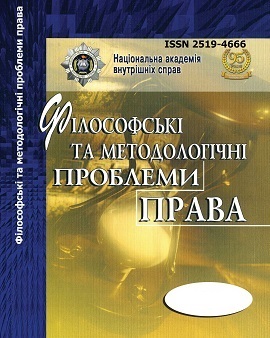Pluralism of Methodological Approaches in Legal and Linguistic Research
Abstract
The paragraph is devoted to the coverage of individual methodological approaches to comprehension of legal linguistic problems of modern jurisprudence. Attention is focused on the fact, that legal linguistic is a complex and multifaceted phenomenon that has a dual nature of its origin.
The main purpose of the article is a description of plurality of methodological approaches used in the process of legal and linguistic studies of the modern jurisprudence, to achieve which it is expected to solve the following issues – to outline the specifics of the modern consideration of law in the light of the dominance of the concept of natural law and human rights, to reveal the nature of certain methodological approaches and their instrumental while studying the issues of legal and linguistic nature.
The method of system analysis and hermeneutic method are the methodological basis for the preparation of the proposed article, due to which it is possible to comprehend the content of legal doctrinal texts, to make their certain generalizations.
Significant contribution to the development of the methodological approaches in legal science has been made by M. Patey-Bratasiuk, M. Kelman, M. Koziubra, P. Rabinovich, O. Tikhomirov, A. Kuchuk and others. Legal and linguistic studies are less generalized and systematic, so every author who made a research in the field of legal linguistics, and along with the definition of the subject area, development of the specific terms, made a significant contribution to the development of methodological principles, the following authors are among them: Y. Pradid, M. Holiev, N. Artуkutsa, E. Galiashina, S. Zaharina, S. Kravchenko, Y. Vlasov.
The most important conclusions of the article are the following:
1) legal Linguistics among other legal phenomena is a complex and diverse phenomenon, which has the dual nature of its origin, and being a tool and a way of formalization of law as a body of social ideals, requires the use of a comprehensive approach to understanding of the legal and linguistic issues of modern legal reality;
2) the most useful and appropriate in understanding of the mentioned problems are systematic, dogmatic and hermeneutic research approaches, the use of which is stipulated by the peculiarities of the complex nature of forms and ways of organization of legal and linguistic knowledge and objectivity of the existence and interaction of different forms (sources) of law, due to which through which law acquires the feature of formality.
Downloads
Abstract views: 119 PDF Downloads: 402
Copyright (c) 2018 Philosophical and Methodological Problems of Law

This work is licensed under a Creative Commons Attribution-NonCommercial-NoDerivatives 4.0 International License.
- Authors reserve the right to authorship of their own work and transfer to the magazine the right of the first publication of this work under the terms of the Creative Commons Attribution License, which allows other persons to freely distribute published work with mandatory reference to authors of the original work and the first publication of an article in this magazine.
- Authors have the right to enter into separate additional agreements on non-exclusive dissemination of the work in the form in which it was published in the journal (for example, to post an article in the institution's repository or to publish as part of a monograph), provided that the link to the first publication of the work in this journal is maintained.
- The journal's policy allows and encourages the posting of articles by authors on the Internet (for example, in electronic storehouses of institutions or on personal websites), both before the submission of this manuscript to the editorial office and during its editorial processing, as this contributes to the creation of a productive scientific discussion and positively affects the efficiency and dynamics of citing the published work.




